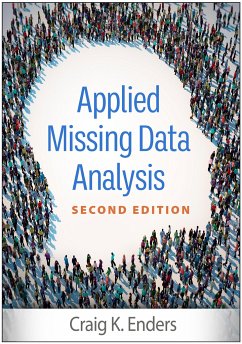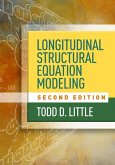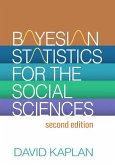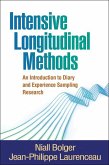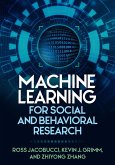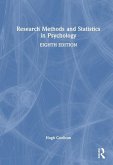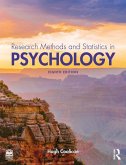Craig K. Enders (United States Arizona State University)
Applied Missing Data Analysis
Craig K. Enders (United States Arizona State University)
Applied Missing Data Analysis
- Gebundenes Buch
- Merkliste
- Auf die Merkliste
- Bewerten Bewerten
- Teilen
- Produkt teilen
- Produkterinnerung
- Produkterinnerung
The most user-friendly and authoritative resource on missing data has been completely revised to make room for the latest developments that make handling missing data more effective. The second edition includes new methods based on factored regressions, newer model-based imputation strategies, and innovations in Bayesian analysis. State-of-the-art technical literature is translated into accessible guidelines for applied researchers and graduate students. The second edition takes an even, three-pronged approach to maximum likelihood estimation, Bayesian estimation, and multiple imputation. The…mehr
Andere Kunden interessierten sich auch für
![Longitudinal Structural Equation Modeling Longitudinal Structural Equation Modeling]() Todd D. Little (United States Texas Tech University)Longitudinal Structural Equation Modeling104,99 €
Todd D. Little (United States Texas Tech University)Longitudinal Structural Equation Modeling104,99 €![Bayesian Statistics for the Social Sciences Bayesian Statistics for the Social Sciences]() David Kaplan (United States University of Wisconsinâ Madison)Bayesian Statistics for the Social Sciences84,99 €
David Kaplan (United States University of Wisconsinâ Madison)Bayesian Statistics for the Social Sciences84,99 €![Intensive Longitudinal Methods Intensive Longitudinal Methods]() Niall Bolger (United States Columbia University)Intensive Longitudinal Methods73,99 €
Niall Bolger (United States Columbia University)Intensive Longitudinal Methods73,99 €![Machine Learning for Social and Behavioral Research Machine Learning for Social and Behavioral Research]() Ross JacobucciMachine Learning for Social and Behavioral Research77,99 €
Ross JacobucciMachine Learning for Social and Behavioral Research77,99 €![Statistics Translated Statistics Translated]() Steven R. TerrellStatistics Translated59,99 €
Steven R. TerrellStatistics Translated59,99 €![Research Methods and Statistics in Psychology Research Methods and Statistics in Psychology]() Hugh Coolican (UK Coventry University)Research Methods and Statistics in Psychology208,99 €
Hugh Coolican (UK Coventry University)Research Methods and Statistics in Psychology208,99 €![Research Methods and Statistics in Psychology Research Methods and Statistics in Psychology]() Hugh Coolican (UK Coventry University)Research Methods and Statistics in Psychology50,99 €
Hugh Coolican (UK Coventry University)Research Methods and Statistics in Psychology50,99 €-
-
-
The most user-friendly and authoritative resource on missing data has been completely revised to make room for the latest developments that make handling missing data more effective. The second edition includes new methods based on factored regressions, newer model-based imputation strategies, and innovations in Bayesian analysis. State-of-the-art technical literature is translated into accessible guidelines for applied researchers and graduate students. The second edition takes an even, three-pronged approach to maximum likelihood estimation, Bayesian estimation, and multiple imputation. The companion website includes datasets and analysis examples from the book, plus other resources.
Produktdetails
- Produktdetails
- Verlag: Guilford Publications
- 2 ed
- Seitenzahl: 546
- Erscheinungstermin: 31. August 2022
- Englisch
- Abmessung: 257mm x 186mm x 32mm
- Gewicht: 1092g
- ISBN-13: 9781462549863
- ISBN-10: 1462549861
- Artikelnr.: 63698973
- Herstellerkennzeichnung
- Libri GmbH
- Europaallee 1
- 36244 Bad Hersfeld
- gpsr@libri.de
- Verlag: Guilford Publications
- 2 ed
- Seitenzahl: 546
- Erscheinungstermin: 31. August 2022
- Englisch
- Abmessung: 257mm x 186mm x 32mm
- Gewicht: 1092g
- ISBN-13: 9781462549863
- ISBN-10: 1462549861
- Artikelnr.: 63698973
- Herstellerkennzeichnung
- Libri GmbH
- Europaallee 1
- 36244 Bad Hersfeld
- gpsr@libri.de
Craig K. Enders, PhD, is Professor and Area Chair in Quantitative Psychology in the Department of Psychology at the University of California, Los Angeles. His primary research focus is on analytic issues related to missing data analyses, and he leads the research team responsible for developing the Blimp software application for missing data analyses. Dr. Enders also conducts research in the areas of multilevel modeling and structural equation modeling, and is an active member of the Society of Multivariate Experimental Psychology, the American Psychological Association, and the American Educational Research Association.
1. Introduction to Missing Data
1.1 Chapter Overview
1.2 Missing Data Patterns
1.3 Missing Data Mechanisms
1.4 Diagnosing Missing Data Mechanisms
1.5 Auxiliary Variables
1.6 Analysis Example: Preparing for Missing Data Handling
1.7 Older Missing Data Methods
1.8 Comparing Missing Data Methods via Simulation
1.9 Planned Missing Data
1.10 Power Analyses for Planned Missingness Designs
1.11 Summary and Recommended Readings
2. Maximum Likelihood Estimation
2.1 Chapter Overview
2.2 Probability Distributions versus Likelihood Functions
2.3 The Univariate Normal Distribution
2.4 Estimating Unknown Parameters
2.5 Getting an Analytic Solution
2.6 Estimating Standard Errors
2.7 Information Matrix and Parameter Covariance Matrix
2.8 Alternative Approaches to Estimating Standard Errors
2.9 Iterative Optimization Algorithms
2.10 Linear Regression
2.11 Significance Tests
2.12 Multivariate Normal Data
2.13 Categorical Outcomes: Logistic and Probit Regression
2.14 Summary and Recommended Readings
3. Maximum Likelihood Estimation with Missing Data
3.1 Chapter Overview
3.2 The Multivariate Normal Distribution Revisited
3.3 How Do Incomplete Data Records Help?
3.4 Standard Errors with Incomplete Data
3.5 The Expectation Maximization Algorithm
3.6 Linear Regression
3.7 Significance Testing
3.8 Interaction Effects
3.9 Curvilinear Effects
3.10 Auxiliary Variables
3.11 Categorical Outcomes
3.12 Summary and Recommended Readings
4. Bayesian Estimation
4.1 Chapter Overview
4.2 What Makes Bayesian Statistics Different?
4.3 Conceptual Overview of Bayesian Estimation
4.4 Bayes' Theorem
4.5 The Univariate Normal Distribution
4.6 MCMC Estimation with the Gibbs Sampler
4.7 Estimating the Mean and Variance with MCMC
4.8 Linear Regression
4.9 Assessing Convergence of the Gibbs Sampler
4.10 Multivariate Normal Data
4.11 Summary and Recommended Readings
5. Bayesian Estimation with Missing Data
5.1 Chapter Overview
5.2 Imputing an Incomplete Outcome Variable
5.3 Linear Regression
5.4 Interaction Effects
5.5 Inspecting Imputations
5.6 The Metropolis-Hastings Algorithm
5.7 Curvilinear Effects
5.8 Auxiliary Variables
5.9 Multivariate Normal Data
5.10 Summary and Recommended Readings
6. Bayesian Estimation for Categorical Variables
6.1 Chapter Overview
6.2 Latent Response Formulation for Categorical Variables
6.3 Regression with a Binary Outcome
6.4 Regression with an Ordinal Outcome
6.5 Binary and Ordinal Predictor Variables
6.6 Latent Response Formulation for Nominal Variables
6.7 Regression with a Nominal Outcome
6.8 Nominal Predictor Variables
6.9 Logistic Regression
6.10 Summary and Recommended Readings
7. Multiple Imputation
7.1 Chapter Overview
7.2 Agnostic versus Model-Based Multiple Imputation
7.3 Joint Model Imputation
7.4 Fully Conditional Specification
7.5 Analyzing Multiply-Imputed Data Sets
7.6 Pooling Parameter Estimates
7.7 Pooling Standard Errors
7.8 Test Statistic and Confidence Intervals
7.9 When Might Multiple Imputation Give Different Answers?
7.10 Interaction and Curvilinear Effects Revisited
7.11 Model-Based Imputation
7.12 Multivariate Significance Tests
7.13 Summary and Recommended Readings
8. Multilevel Missing Data
8.1 Chapter Overview
8.2 Random Intercept Regression Models
8.3 Random Coefficient Models
8.4 Multilevel Interaction Effects
8.5 Three-Level Models
8.6 Multiple Imputation
8.7 Joint Model Imputation
8.8 Fully Conditional Specification Imputation
8.9 Maximum Likelihood Estimation
8.10 Summary and Recommended Readings
9. Missing Not at Random Processes
9.1 Chapter Overview
9.2 Missing Not at Random Processes Revisited
9.3 Major Modeling Frameworks
9.4 Selection Models for Multiple Regression
9.5 Model Comparisons and Individual Influence Diagnostics
9.6 Selection Model Analysis Examples
9.7 Pattern Mixture Models for Multiple Regression
9.8 Pattern Mixture Model Analysis Examples
9.9 Longitudinal Data Analyses
9.10 Diggle-Kenward Selection Model
9.11 Shared Parameter (Random Coefficient) Selection Model
9.12 Random Coefficient Pattern Mixture Models
9.13 Longitudinal Data Analysis Examples
9.14 Summary and Recommended Readings
10. Special Topics and Applications
10.1 Chapter Overview
10.2 Descriptive Summaries, Correlations, and Subgroups
10.3 Non-Normal Predictor Variables
10.4 Non-Normal Outcome Variables
10.5 Mediation and Indirect Effects
10.6 Structural Equation Models
10.7 Scale Scores and Missing Questionnaire Items
10.8 Interactions with Scales
10.9 Longitudinal Data Analyses
10.10 Regression with a Count Outcome
10.11 Power Analyses for Growth Models with Missing Data
10.12 Summary and Recommended Readings
11. Wrap-Up
11.1 Chapter Overview
11.2 Choosing a Missing Data-Handling Procedure
11.3 Software Landscape
11.4 Reporting Results from a Missing Data Analysis
11.5 Final Thoughts and Recommended Readings
Appendix. Data Set Descriptions
Author Index
Subject Index
About the Author
1.1 Chapter Overview
1.2 Missing Data Patterns
1.3 Missing Data Mechanisms
1.4 Diagnosing Missing Data Mechanisms
1.5 Auxiliary Variables
1.6 Analysis Example: Preparing for Missing Data Handling
1.7 Older Missing Data Methods
1.8 Comparing Missing Data Methods via Simulation
1.9 Planned Missing Data
1.10 Power Analyses for Planned Missingness Designs
1.11 Summary and Recommended Readings
2. Maximum Likelihood Estimation
2.1 Chapter Overview
2.2 Probability Distributions versus Likelihood Functions
2.3 The Univariate Normal Distribution
2.4 Estimating Unknown Parameters
2.5 Getting an Analytic Solution
2.6 Estimating Standard Errors
2.7 Information Matrix and Parameter Covariance Matrix
2.8 Alternative Approaches to Estimating Standard Errors
2.9 Iterative Optimization Algorithms
2.10 Linear Regression
2.11 Significance Tests
2.12 Multivariate Normal Data
2.13 Categorical Outcomes: Logistic and Probit Regression
2.14 Summary and Recommended Readings
3. Maximum Likelihood Estimation with Missing Data
3.1 Chapter Overview
3.2 The Multivariate Normal Distribution Revisited
3.3 How Do Incomplete Data Records Help?
3.4 Standard Errors with Incomplete Data
3.5 The Expectation Maximization Algorithm
3.6 Linear Regression
3.7 Significance Testing
3.8 Interaction Effects
3.9 Curvilinear Effects
3.10 Auxiliary Variables
3.11 Categorical Outcomes
3.12 Summary and Recommended Readings
4. Bayesian Estimation
4.1 Chapter Overview
4.2 What Makes Bayesian Statistics Different?
4.3 Conceptual Overview of Bayesian Estimation
4.4 Bayes' Theorem
4.5 The Univariate Normal Distribution
4.6 MCMC Estimation with the Gibbs Sampler
4.7 Estimating the Mean and Variance with MCMC
4.8 Linear Regression
4.9 Assessing Convergence of the Gibbs Sampler
4.10 Multivariate Normal Data
4.11 Summary and Recommended Readings
5. Bayesian Estimation with Missing Data
5.1 Chapter Overview
5.2 Imputing an Incomplete Outcome Variable
5.3 Linear Regression
5.4 Interaction Effects
5.5 Inspecting Imputations
5.6 The Metropolis-Hastings Algorithm
5.7 Curvilinear Effects
5.8 Auxiliary Variables
5.9 Multivariate Normal Data
5.10 Summary and Recommended Readings
6. Bayesian Estimation for Categorical Variables
6.1 Chapter Overview
6.2 Latent Response Formulation for Categorical Variables
6.3 Regression with a Binary Outcome
6.4 Regression with an Ordinal Outcome
6.5 Binary and Ordinal Predictor Variables
6.6 Latent Response Formulation for Nominal Variables
6.7 Regression with a Nominal Outcome
6.8 Nominal Predictor Variables
6.9 Logistic Regression
6.10 Summary and Recommended Readings
7. Multiple Imputation
7.1 Chapter Overview
7.2 Agnostic versus Model-Based Multiple Imputation
7.3 Joint Model Imputation
7.4 Fully Conditional Specification
7.5 Analyzing Multiply-Imputed Data Sets
7.6 Pooling Parameter Estimates
7.7 Pooling Standard Errors
7.8 Test Statistic and Confidence Intervals
7.9 When Might Multiple Imputation Give Different Answers?
7.10 Interaction and Curvilinear Effects Revisited
7.11 Model-Based Imputation
7.12 Multivariate Significance Tests
7.13 Summary and Recommended Readings
8. Multilevel Missing Data
8.1 Chapter Overview
8.2 Random Intercept Regression Models
8.3 Random Coefficient Models
8.4 Multilevel Interaction Effects
8.5 Three-Level Models
8.6 Multiple Imputation
8.7 Joint Model Imputation
8.8 Fully Conditional Specification Imputation
8.9 Maximum Likelihood Estimation
8.10 Summary and Recommended Readings
9. Missing Not at Random Processes
9.1 Chapter Overview
9.2 Missing Not at Random Processes Revisited
9.3 Major Modeling Frameworks
9.4 Selection Models for Multiple Regression
9.5 Model Comparisons and Individual Influence Diagnostics
9.6 Selection Model Analysis Examples
9.7 Pattern Mixture Models for Multiple Regression
9.8 Pattern Mixture Model Analysis Examples
9.9 Longitudinal Data Analyses
9.10 Diggle-Kenward Selection Model
9.11 Shared Parameter (Random Coefficient) Selection Model
9.12 Random Coefficient Pattern Mixture Models
9.13 Longitudinal Data Analysis Examples
9.14 Summary and Recommended Readings
10. Special Topics and Applications
10.1 Chapter Overview
10.2 Descriptive Summaries, Correlations, and Subgroups
10.3 Non-Normal Predictor Variables
10.4 Non-Normal Outcome Variables
10.5 Mediation and Indirect Effects
10.6 Structural Equation Models
10.7 Scale Scores and Missing Questionnaire Items
10.8 Interactions with Scales
10.9 Longitudinal Data Analyses
10.10 Regression with a Count Outcome
10.11 Power Analyses for Growth Models with Missing Data
10.12 Summary and Recommended Readings
11. Wrap-Up
11.1 Chapter Overview
11.2 Choosing a Missing Data-Handling Procedure
11.3 Software Landscape
11.4 Reporting Results from a Missing Data Analysis
11.5 Final Thoughts and Recommended Readings
Appendix. Data Set Descriptions
Author Index
Subject Index
About the Author
1. Introduction to Missing Data
1.1 Chapter Overview
1.2 Missing Data Patterns
1.3 Missing Data Mechanisms
1.4 Diagnosing Missing Data Mechanisms
1.5 Auxiliary Variables
1.6 Analysis Example: Preparing for Missing Data Handling
1.7 Older Missing Data Methods
1.8 Comparing Missing Data Methods via Simulation
1.9 Planned Missing Data
1.10 Power Analyses for Planned Missingness Designs
1.11 Summary and Recommended Readings
2. Maximum Likelihood Estimation
2.1 Chapter Overview
2.2 Probability Distributions versus Likelihood Functions
2.3 The Univariate Normal Distribution
2.4 Estimating Unknown Parameters
2.5 Getting an Analytic Solution
2.6 Estimating Standard Errors
2.7 Information Matrix and Parameter Covariance Matrix
2.8 Alternative Approaches to Estimating Standard Errors
2.9 Iterative Optimization Algorithms
2.10 Linear Regression
2.11 Significance Tests
2.12 Multivariate Normal Data
2.13 Categorical Outcomes: Logistic and Probit Regression
2.14 Summary and Recommended Readings
3. Maximum Likelihood Estimation with Missing Data
3.1 Chapter Overview
3.2 The Multivariate Normal Distribution Revisited
3.3 How Do Incomplete Data Records Help?
3.4 Standard Errors with Incomplete Data
3.5 The Expectation Maximization Algorithm
3.6 Linear Regression
3.7 Significance Testing
3.8 Interaction Effects
3.9 Curvilinear Effects
3.10 Auxiliary Variables
3.11 Categorical Outcomes
3.12 Summary and Recommended Readings
4. Bayesian Estimation
4.1 Chapter Overview
4.2 What Makes Bayesian Statistics Different?
4.3 Conceptual Overview of Bayesian Estimation
4.4 Bayes' Theorem
4.5 The Univariate Normal Distribution
4.6 MCMC Estimation with the Gibbs Sampler
4.7 Estimating the Mean and Variance with MCMC
4.8 Linear Regression
4.9 Assessing Convergence of the Gibbs Sampler
4.10 Multivariate Normal Data
4.11 Summary and Recommended Readings
5. Bayesian Estimation with Missing Data
5.1 Chapter Overview
5.2 Imputing an Incomplete Outcome Variable
5.3 Linear Regression
5.4 Interaction Effects
5.5 Inspecting Imputations
5.6 The Metropolis-Hastings Algorithm
5.7 Curvilinear Effects
5.8 Auxiliary Variables
5.9 Multivariate Normal Data
5.10 Summary and Recommended Readings
6. Bayesian Estimation for Categorical Variables
6.1 Chapter Overview
6.2 Latent Response Formulation for Categorical Variables
6.3 Regression with a Binary Outcome
6.4 Regression with an Ordinal Outcome
6.5 Binary and Ordinal Predictor Variables
6.6 Latent Response Formulation for Nominal Variables
6.7 Regression with a Nominal Outcome
6.8 Nominal Predictor Variables
6.9 Logistic Regression
6.10 Summary and Recommended Readings
7. Multiple Imputation
7.1 Chapter Overview
7.2 Agnostic versus Model-Based Multiple Imputation
7.3 Joint Model Imputation
7.4 Fully Conditional Specification
7.5 Analyzing Multiply-Imputed Data Sets
7.6 Pooling Parameter Estimates
7.7 Pooling Standard Errors
7.8 Test Statistic and Confidence Intervals
7.9 When Might Multiple Imputation Give Different Answers?
7.10 Interaction and Curvilinear Effects Revisited
7.11 Model-Based Imputation
7.12 Multivariate Significance Tests
7.13 Summary and Recommended Readings
8. Multilevel Missing Data
8.1 Chapter Overview
8.2 Random Intercept Regression Models
8.3 Random Coefficient Models
8.4 Multilevel Interaction Effects
8.5 Three-Level Models
8.6 Multiple Imputation
8.7 Joint Model Imputation
8.8 Fully Conditional Specification Imputation
8.9 Maximum Likelihood Estimation
8.10 Summary and Recommended Readings
9. Missing Not at Random Processes
9.1 Chapter Overview
9.2 Missing Not at Random Processes Revisited
9.3 Major Modeling Frameworks
9.4 Selection Models for Multiple Regression
9.5 Model Comparisons and Individual Influence Diagnostics
9.6 Selection Model Analysis Examples
9.7 Pattern Mixture Models for Multiple Regression
9.8 Pattern Mixture Model Analysis Examples
9.9 Longitudinal Data Analyses
9.10 Diggle-Kenward Selection Model
9.11 Shared Parameter (Random Coefficient) Selection Model
9.12 Random Coefficient Pattern Mixture Models
9.13 Longitudinal Data Analysis Examples
9.14 Summary and Recommended Readings
10. Special Topics and Applications
10.1 Chapter Overview
10.2 Descriptive Summaries, Correlations, and Subgroups
10.3 Non-Normal Predictor Variables
10.4 Non-Normal Outcome Variables
10.5 Mediation and Indirect Effects
10.6 Structural Equation Models
10.7 Scale Scores and Missing Questionnaire Items
10.8 Interactions with Scales
10.9 Longitudinal Data Analyses
10.10 Regression with a Count Outcome
10.11 Power Analyses for Growth Models with Missing Data
10.12 Summary and Recommended Readings
11. Wrap-Up
11.1 Chapter Overview
11.2 Choosing a Missing Data-Handling Procedure
11.3 Software Landscape
11.4 Reporting Results from a Missing Data Analysis
11.5 Final Thoughts and Recommended Readings
Appendix. Data Set Descriptions
Author Index
Subject Index
About the Author
1.1 Chapter Overview
1.2 Missing Data Patterns
1.3 Missing Data Mechanisms
1.4 Diagnosing Missing Data Mechanisms
1.5 Auxiliary Variables
1.6 Analysis Example: Preparing for Missing Data Handling
1.7 Older Missing Data Methods
1.8 Comparing Missing Data Methods via Simulation
1.9 Planned Missing Data
1.10 Power Analyses for Planned Missingness Designs
1.11 Summary and Recommended Readings
2. Maximum Likelihood Estimation
2.1 Chapter Overview
2.2 Probability Distributions versus Likelihood Functions
2.3 The Univariate Normal Distribution
2.4 Estimating Unknown Parameters
2.5 Getting an Analytic Solution
2.6 Estimating Standard Errors
2.7 Information Matrix and Parameter Covariance Matrix
2.8 Alternative Approaches to Estimating Standard Errors
2.9 Iterative Optimization Algorithms
2.10 Linear Regression
2.11 Significance Tests
2.12 Multivariate Normal Data
2.13 Categorical Outcomes: Logistic and Probit Regression
2.14 Summary and Recommended Readings
3. Maximum Likelihood Estimation with Missing Data
3.1 Chapter Overview
3.2 The Multivariate Normal Distribution Revisited
3.3 How Do Incomplete Data Records Help?
3.4 Standard Errors with Incomplete Data
3.5 The Expectation Maximization Algorithm
3.6 Linear Regression
3.7 Significance Testing
3.8 Interaction Effects
3.9 Curvilinear Effects
3.10 Auxiliary Variables
3.11 Categorical Outcomes
3.12 Summary and Recommended Readings
4. Bayesian Estimation
4.1 Chapter Overview
4.2 What Makes Bayesian Statistics Different?
4.3 Conceptual Overview of Bayesian Estimation
4.4 Bayes' Theorem
4.5 The Univariate Normal Distribution
4.6 MCMC Estimation with the Gibbs Sampler
4.7 Estimating the Mean and Variance with MCMC
4.8 Linear Regression
4.9 Assessing Convergence of the Gibbs Sampler
4.10 Multivariate Normal Data
4.11 Summary and Recommended Readings
5. Bayesian Estimation with Missing Data
5.1 Chapter Overview
5.2 Imputing an Incomplete Outcome Variable
5.3 Linear Regression
5.4 Interaction Effects
5.5 Inspecting Imputations
5.6 The Metropolis-Hastings Algorithm
5.7 Curvilinear Effects
5.8 Auxiliary Variables
5.9 Multivariate Normal Data
5.10 Summary and Recommended Readings
6. Bayesian Estimation for Categorical Variables
6.1 Chapter Overview
6.2 Latent Response Formulation for Categorical Variables
6.3 Regression with a Binary Outcome
6.4 Regression with an Ordinal Outcome
6.5 Binary and Ordinal Predictor Variables
6.6 Latent Response Formulation for Nominal Variables
6.7 Regression with a Nominal Outcome
6.8 Nominal Predictor Variables
6.9 Logistic Regression
6.10 Summary and Recommended Readings
7. Multiple Imputation
7.1 Chapter Overview
7.2 Agnostic versus Model-Based Multiple Imputation
7.3 Joint Model Imputation
7.4 Fully Conditional Specification
7.5 Analyzing Multiply-Imputed Data Sets
7.6 Pooling Parameter Estimates
7.7 Pooling Standard Errors
7.8 Test Statistic and Confidence Intervals
7.9 When Might Multiple Imputation Give Different Answers?
7.10 Interaction and Curvilinear Effects Revisited
7.11 Model-Based Imputation
7.12 Multivariate Significance Tests
7.13 Summary and Recommended Readings
8. Multilevel Missing Data
8.1 Chapter Overview
8.2 Random Intercept Regression Models
8.3 Random Coefficient Models
8.4 Multilevel Interaction Effects
8.5 Three-Level Models
8.6 Multiple Imputation
8.7 Joint Model Imputation
8.8 Fully Conditional Specification Imputation
8.9 Maximum Likelihood Estimation
8.10 Summary and Recommended Readings
9. Missing Not at Random Processes
9.1 Chapter Overview
9.2 Missing Not at Random Processes Revisited
9.3 Major Modeling Frameworks
9.4 Selection Models for Multiple Regression
9.5 Model Comparisons and Individual Influence Diagnostics
9.6 Selection Model Analysis Examples
9.7 Pattern Mixture Models for Multiple Regression
9.8 Pattern Mixture Model Analysis Examples
9.9 Longitudinal Data Analyses
9.10 Diggle-Kenward Selection Model
9.11 Shared Parameter (Random Coefficient) Selection Model
9.12 Random Coefficient Pattern Mixture Models
9.13 Longitudinal Data Analysis Examples
9.14 Summary and Recommended Readings
10. Special Topics and Applications
10.1 Chapter Overview
10.2 Descriptive Summaries, Correlations, and Subgroups
10.3 Non-Normal Predictor Variables
10.4 Non-Normal Outcome Variables
10.5 Mediation and Indirect Effects
10.6 Structural Equation Models
10.7 Scale Scores and Missing Questionnaire Items
10.8 Interactions with Scales
10.9 Longitudinal Data Analyses
10.10 Regression with a Count Outcome
10.11 Power Analyses for Growth Models with Missing Data
10.12 Summary and Recommended Readings
11. Wrap-Up
11.1 Chapter Overview
11.2 Choosing a Missing Data-Handling Procedure
11.3 Software Landscape
11.4 Reporting Results from a Missing Data Analysis
11.5 Final Thoughts and Recommended Readings
Appendix. Data Set Descriptions
Author Index
Subject Index
About the Author

